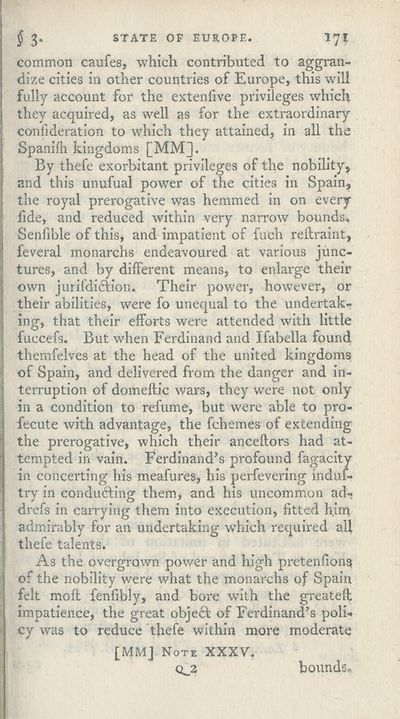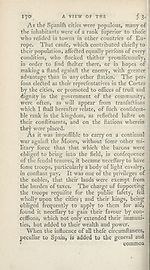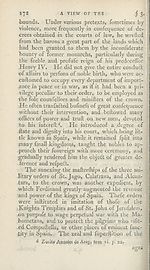Download files
Complete book:
Individual page:
Thumbnail gallery: Grid view | List view

$ 3* STATE OF EUROPE. I7I
common caufes, which contributed to aggran¬
dize cities in other countries of Europe, this will
fully account for the extenlive privileges which
they acquired, as well as for the extraordinary
conlideration to which they attained, in all the
Spanifli kingdoms [MM].
By thefe exorbitant privileges of the nobility,
and this unufual power of the cities in Spain,
the royal prerogative was hemmed in on every
fide, and reduced within very narrow bounds.
Senfible of this, and impatient of fuch reftraint,
feveral monarchs endeavoured at various junc¬
tures, and by different means, to enlarge their
own jurildidfion. Their power, however, or
their abilities, were fo unequal to the undertak¬
ing, that their efforts were attended with little
fuccefs. But when Ferdinand and Ifabella found
themfelves at the head of the united kingdoms
of Spain, and delivered from the danger and in¬
terruption of domeitic wars, they were not only
in a condition to refume, but were able to pro-
fecute with advantage, the fchemes of extending
the prerogative, which their anceflors had at¬
tempted in vain. Ferdinand’s profound fagacity
in concerting his meafures, his perfevering induf-
try in conducing them, and his uncommon ad-
drefs in carrying them into execution, fitted him
admirably for an undertaking which required all
thefe talents.
As the overgrown power and high pretenfions
of the nobility were what the monarchs of Spain
felt moll fenfibly, and bore with the greateft
impatience, the great objeft of Ferdinand’s poli¬
cy was to reduce thefe within more moderate
[MM] Non XXXV.
CL2
bounds.
common caufes, which contributed to aggran¬
dize cities in other countries of Europe, this will
fully account for the extenlive privileges which
they acquired, as well as for the extraordinary
conlideration to which they attained, in all the
Spanifli kingdoms [MM].
By thefe exorbitant privileges of the nobility,
and this unufual power of the cities in Spain,
the royal prerogative was hemmed in on every
fide, and reduced within very narrow bounds.
Senfible of this, and impatient of fuch reftraint,
feveral monarchs endeavoured at various junc¬
tures, and by different means, to enlarge their
own jurildidfion. Their power, however, or
their abilities, were fo unequal to the undertak¬
ing, that their efforts were attended with little
fuccefs. But when Ferdinand and Ifabella found
themfelves at the head of the united kingdoms
of Spain, and delivered from the danger and in¬
terruption of domeitic wars, they were not only
in a condition to refume, but were able to pro-
fecute with advantage, the fchemes of extending
the prerogative, which their anceflors had at¬
tempted in vain. Ferdinand’s profound fagacity
in concerting his meafures, his perfevering induf-
try in conducing them, and his uncommon ad-
drefs in carrying them into execution, fitted him
admirably for an undertaking which required all
thefe talents.
As the overgrown power and high pretenfions
of the nobility were what the monarchs of Spain
felt moll fenfibly, and bore with the greateft
impatience, the great objeft of Ferdinand’s poli¬
cy was to reduce thefe within more moderate
[MM] Non XXXV.
CL2
bounds.
Set display mode to:
![]() Universal Viewer |
Universal Viewer | ![]() Mirador |
Large image | Transcription
Mirador |
Large image | Transcription
| Antiquarian books of Scotland > Kings & rulers > History of the reign of the Emperor Charles V. > Volume 1 > (189) |
|---|
| Permanent URL | https://digital.nls.uk/109184599 |
|---|
| Description | By William Robertson. London : Cadell and Davies, 1798. |
|---|---|
| Shelfmark | ABS.1.76.13 |
| Additional NLS resources: | |
| Description | Thousands of printed books from the Antiquarian Books of Scotland collection which dates from 1641 to the 1980s. The collection consists of 14,800 books which were published in Scotland or have a Scottish connection, e.g. through the author, printer or owner. Subjects covered include sport, education, diseases, adventure, occupations, Jacobites, politics and religion. Among the 29 languages represented are English, Gaelic, Italian, French, Russian and Swedish. |
|---|

